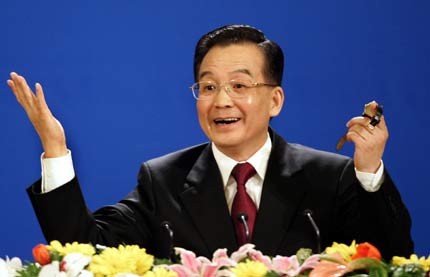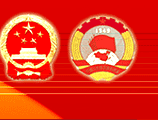Beijing is preparing for all eventualities as Taiwan leader Chen Shui-bian has intensified his secessionist push for the island's "de jure independence," Premier Wen Jiabao said yesterday.
He accused Chen of seriously damaging cross-Straits peace and stability with his February 27 decision to scrap a government body that sought eventual unification with the mainland.

Chinese Premier Wen Jiabao holds his watch as he extends his news conference for two more questions after the National People's Congress at the Great Hall of the People in China's capital Beijing March 14, 2006. [Reuters] |
Chen's actions are "highly risky, dangerous and deceptive," Wen told a press conference following the end of the annual session of the National People's Congress (NPC), China's top legislature.
"We should guard against the escalated secessionist moves to push forward the 'constitutional re-engineering' project aimed at 'de jure independence'," the premier said.
"We are keeping a close watch on the development and preparing to deal with any possible consequences."
He said the mainland "will never waver in its opposition to secessionist activities and will by no means allow Taiwan to secede from the motherland."
Wen also offered to hold talks with Chen's ruling Democratic Progressive Party as long as it drops its pro-independence platform.
The premier reiterated that Beijing is willing to talk to any individual or political party from the island under the one-China principle, which maintains that both Taiwan and the mainland belong to one and the same China.
At the two-hour nationally-televised press conference, Wen also talked about major topics ranging from the rural poor, Internet freedom, education and foreign relations to environmental protection.
As a sign of the top Chinese leadership's commitment to reform and opening-up, Wen pledged to unswervingly press ahead with the country's decades-old reform agenda.
"Although there will be difficulties in the way ahead, we cannot stop. Back-pedalling is not a way out," he said.
The premier, who called himself "the son of the Chinese people," admitted that the government had failed to adequately tackle some problems that affected ordinary people's livelihoods.
"What upsets me most during my work in the past three years is that I haven't been able to better solve such problems as health care, education, housing and work safety," said the premier.
Wen also acknowledged that many of the more than 750 million farmers are suffering injustices because of the illegal seizures of their farmland.
"We must exercise and enforce the strictest land protection system and safeguard their right to independently farm their contracted land," he said.
The premier noted that reasonable proceeds from land transfers should go to farmers while promising to "mete out harsh punishment" to officials who violate the law to forcibly seize farmland.
Turning to Sino-Japanese relations, Wen stressed that they would not improve until Japanese Prime Minister Junichiro Koizumi stops visiting Yasukuni Shrine, a symbol of Japan's past militarism.
He said Koizumi's repeated visits to the shrine, where notorious war criminals are worshipped, greatly hurt the feelings of the people in China and the rest of Asia.
"Pending a solution to this issue, the China-Japan relationship can hardly develop in a smooth way," Wen said.
Defying criticism and opposition from China and the Republic of Korea, Koizumi has made five visits to the shrine since taking office in 2001.
Wen urged Japan to take practical steps to improve bilateral ties. |





